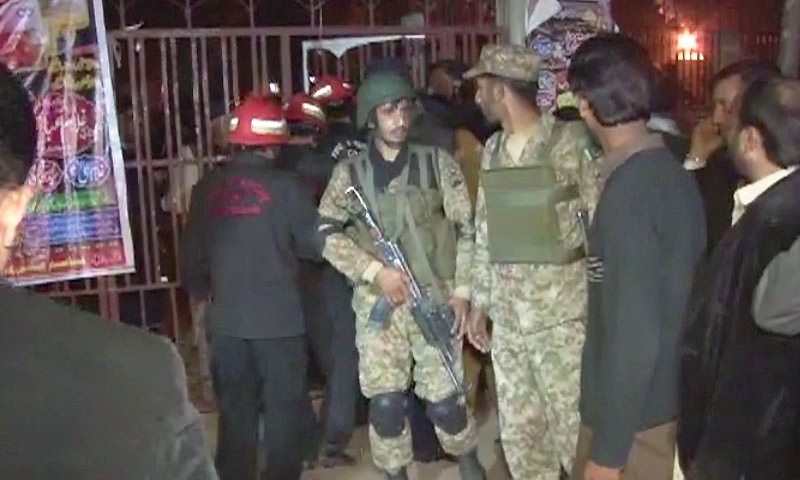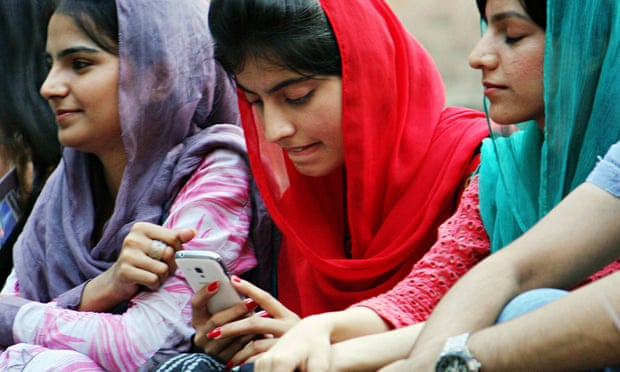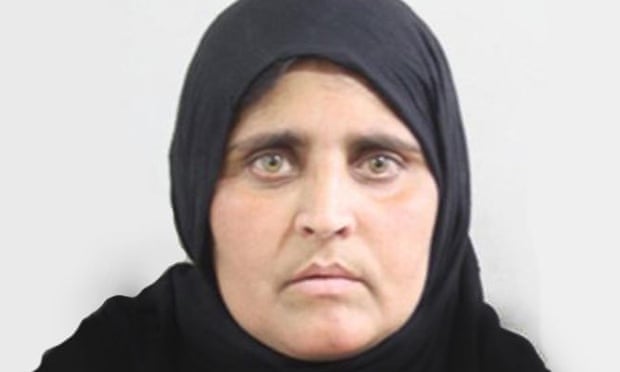RAWALPINDI: Three people were killed and several injured in an explosion on Kurri Road, Rawalpindi within the precincts of an imambargah, hospital sources confirmed Wednesday. The injured are reported to be in critical condition.
Jundullah, a splinter group of Tehreek-i-Taliban Pakistan (TTP), claimed responsibility for the attack. Speaking from an unknown location, spokesman of the group Fagad told Dawn that the blast was a reaction to operation Zarb-e-Azb in North Waziristan.
Spokesperson of Pakistan Institute of Medical Sciences (PIMS), Dr Ayesha Esani told reporters that two bodies were “brought dead” to the hospital, while five critically injured people are under intensive treatment. Dr Esani identified the deceased as Ghulam Hussain and Abdul Shakoor.
An initial investigation suggests the blast occurred when a suicide bomber blew himself up after security officials stopped him from entering the Qasar-e-Sakina Imambargah. The imambargah is located in the vicinity of expressway, the main highway which links the twin cities of Islamabad and Rawalpindi.
SHO Sadiqabad said the body of the attacker is still inside the imambargah and Islamabad police is investigating the blast site to confirm whether it was a suicide attack.
Eyewitness Mohammad Yousaf told Geo News, “When I heard the first shot, I locked the door and told worshippers to hide in the hall. People rushed inside to the mosque and saved themselves.”He added that the worshippers inside the imambargah remained safe, as the casualties include the people who were at the entrance and deployed for the security of the imambargah.
He added that Maghreb prayers had started when the attacker struck, and that security guard Ghulam Hussain was killed.
Another eyewitness told DawnNews said the suicide bomber was about 20-25 years old and was speaking in Seraieki.
 |
|
Security personnel gather outside the Rawalpindi imambargah. – DawnNews screengrab
|
Initial reports say that the alleged bomber was unable to detonate his suicide vest completely, thus preventing a major disaster.
Police was deployed at the imambargah which was packed to capacity at the time of the explosion.
Medical teams and police authorities have rushed to the site to begin rescue operations.The injured have been rushed to PIMS and Poly Clinic Hospital. An emergency has been declared at the hospitals in the twin cities and doctors have been asked to report for duty.
 |
|
A crowd gathers outside the hospital emergency ward as news about the attack spreads
|
There were also reports of firing following the attack, however, the identity of the gunmen has not been determined. The area has been cordoned off by security forces.
PML-N leader Marvi Memon at the site of the blast issued a strong condemnation of the attack on the imambargah. “These are the last splinter affects of the operation Zarb-e-Azb. These are desperate attacks by cornered terrorists,” said Memon.
“We have to be united in this fight against terror,” she added. “It is unfortunate that our people have to pay the price for this but we will not forget the sacrifices our countrymen have made.”
Majlis Wahdat-e-Muslimeen (MWM) Leader Asghar Askari criticised the government and alleged that it was colluding with militants.
“This is the fourth attack [on the Shia community]; this government is a murderous and terrorist government. We have been lifting bodies due to them.”
He alleged that the Punjab government has given support to these terrorists.
“Zarb-e-Azb should be spread to the whole of Punjab,” he said in an appeal to army chief General Raheel Sharif.
“Hundreds of thousands of Shias and Sunnis will be united in a march to the capital.”
Shia community under attack
This is the fourth in a series of major attacks targeting the Shia community this year.
On February 14, at least 21 people were killed and 50 others injured during a gun and bomb attack at an imambargah in Peshawar’s Hayatabad area when suicide attackers and gunmen — dressed in police uniforms — attacked worshippers offering Friday prayers.
Read: 21 killed as Taliban storm Peshawar imambargah
Two weeks prior, a suicide bombing at an Imambargah in Shikarpur killed 61 people — the deadliest sectarian incident to hit the country in nearly two years.
Also read: At least 60 killed in blast at Shikarpur imambargah
Jundullah, a splinter group of Tehreek-i-Taliban Pakistan (TTP), which last year pledged support for the Islamic State took responsibility for the Shikarpur attack as well as the Peshawar imambargah attack.
The Jamatul Ahrar faction of banned Tehreek-i-Taliban Pakistan (TTP) claimed a January attack on a Rawalpindi imambargah which killed eight people and wounded 16 others.
More: TTP Jamatul Ahrar claims attack on Rawalpindi imambargah
The attacks on Shias come amid the ongoing National Action Plan (NAP) aimed at ridding the country of terrorism following the Taliban massacre at Peshawar’s Army Public School in December 2014, which claimed over 140 lives — with most of the victims being children.
The formulation of the plan – a massive operation against militants and extremists – saw a parliamentary consensus on the formation of military courts in the country as well as renewed resolve to counter religious extremism by cracking down on terror financing and regulating madrassahs.
The government also rolled back the moratorium on capital punishment following which a number of convicted terrorists have been hanged in jails across the country.
Since the government set the NAP rolling, the country has seen a number of terrorist attacks — the major ones being attacks on imambargahs.
The recent spate of terror attacks, including the major terror bid at the school in Peshawar, are seen as the blowback of military operation currently underway in the tribal areas of Pakistan.
The army launched operation Zarb-e-Azb following a deadly attack on Karachi airport in June last year, after which security in the country has been on high alert.
Prior to the launch of the operation, the government had feared an intense backlash from militants and their sympathisers. This fear had delayed the operation for years.
The military has been carrying out counter-terrorism actions across the country to prevent retaliatory action by the banned Tehreek-i-Taliban Pakistan (TTP) and other militants groups after the launching of the Zarb-i-Azb in North Waziristan.
Another week, another sectarian attack, yet another attack in Peshawar. While no one expected the state to shut down the militancy complex and suppress terrorism in a matter of weeks, what yesterday’s attack in Peshawar seems to have underlined is that the state strategy in the fight against militancy is inadequate and not wide-ranging enough.
There are at least two points to be made here.
First, the sectarian equation. From Shikarpur to Peshawar, militants have struck against Shias and their places of worship seemingly at will, indicating that yet another front in the militancy wars is once again being aggressively pursued.
While not all militant groups are avowedly and determinedly sectarian, it is nevertheless true that practically all operating here have a sectarian strain.
The failure of the state was in not giving priority to stemming the growth of avowedly sectarian militant groups — the longer those particular groups have been allowed to operate with near impunity, the more it seems to have encouraged other militant outfits to focus on their sectarian agendas.
It is still not too late. The country, despite grievous blows to the Shia community in recent years, is not on the verge of a full-blown sectarian civil war. But if fighting sectarianism is not made a priority now, the implosion in parts of the Middle East is a haunting reminder of how quickly and irreversibly matters can get out of control.
The other aspect is Peshawar. Sitting pressed up against the tribal areas and a regional hub for so many trouble spots, the provincial capital of Khyber Pakhtunkhwa is a front-line city in the fight against militancy.
As such, it will always be a city militants look to stage attacks in. But it cannot be forgotten that Peshawar is also the administrative and military hub from which the state projects its power in the immediate region. The troops fighting in Fata are commanded from Peshawar.
The writ over KP and Fata is administratively handled from Peshawar. As such, it is a city that has vast resources and from where both the civil and military arms of the state have over the years learned how to work in cooperation with each other to help secure it.
In essence, then, why are such large groups of militants, as in the case of the Army Public School attack and now the Shia mosque, still able to so easily penetrate high-security sites in Peshawar?
Surely, that is not too much to ask for — that droves of militants not arrive at their targets undetected from where they proceed to deliver yet another blow to the national psyche?
Something is wrong here and neither the military nor the civilian, provincial and federal, leadership is willing to admit it.
The enemy is proving to be more resilient and smarter than the state that is purporting to fight it.
 via The Dawn News – Home http://ift.tt/1AFTUKk
via The Dawn News – Home http://ift.tt/1AFTUKk







